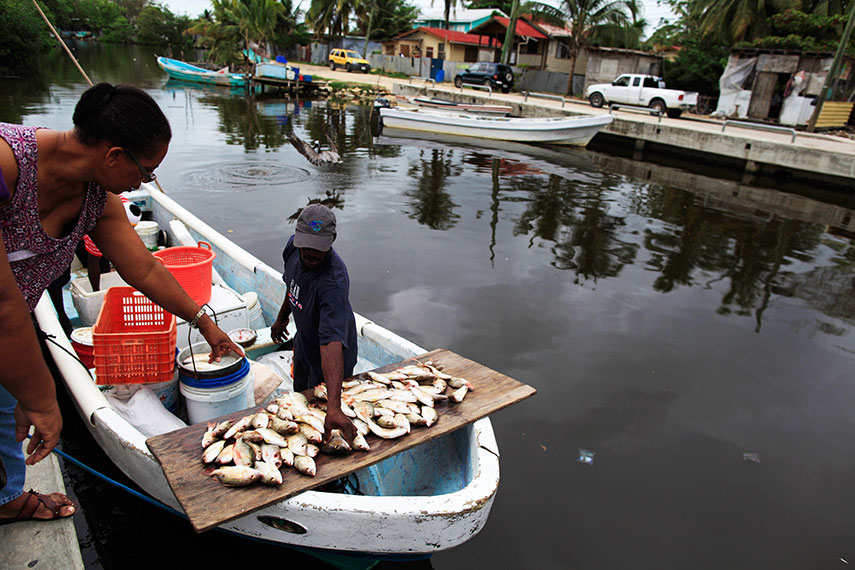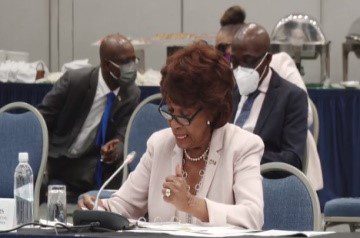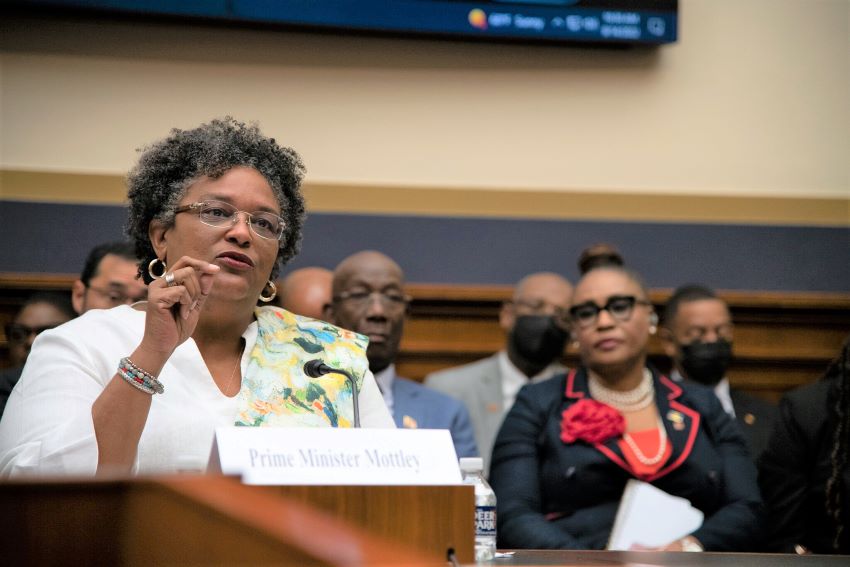BELIZE CITY, Belize – Burdened by chronic back pain, Belize Prime Minister Dean Barrow avoids traveling abroad, his colleagues say. But in January, he flew to Washington and visited one government agency after another on a singular mission: reconnecting his country to the U.S. financial system.
A U.S.-educated lawyer, Barrow made his case before agencies with chief oversight of American banks, including the Federal Deposit Insurance Corporation and the U.S. Treasury’s Office of the Comptroller of the Currency.
His Belizean delegation described how their country had been shunned over the last year by large, reputable American banks, a trend that threatens its tiny economy.
As banks scrub their books of potentially risky businesses amid a tightening regulatory noose, major U.S. financial institutions have ended relationships with regional banks across the Caribbean in the last four years, Caribbean officials and bank executives say.
This so-called “de-risking” or “de-banking,” in which banks pull out of certain lines of business and even parts of the world, has intensified. Enhanced scrutiny on financial fraud and new regulations to stem money laundering and terror finance are all at play.
Yet the de-risking movement has triggered a collision of interests: As banks tighten controls, small, poor countries most dependent on trade say they’re being unfairly cut off from global finance, a case made by Barrow.
“The regulators all agreed that absent a solution, our economies, our societies would go belly up,” he recounted in a speech in February. But in the end, his group left Washington with little more than “tea and sympathy.”
Just two banks in Belize maintain “correspondent banking relationships” with U.S. banks, Atlantic Bank and Scotiabank, each of which have international affiliations. Such bilateral links allow banks to finance trade, settle credit card payments and clear the U.S. dollar-denominated transactions that underpin global commerce.
De-risking threatens the fragile economy of Belize, a country the size of New Jersey with a population of 375,000, a 40 percent poverty rate and an economy based on farming and tourism. Businesses now must set aside weeks to make routine payments to suppliers abroad that used to take moments. Desperate to pass muster with American banks, Belizean banks have dropped customers carrying potential risks, including cash remittance services used by many people working abroad.
Every day, Belizeans struggle to surmount trade barriers.
In south Belize City on a June weekday, Yvonne Williams visited a Western Union agent, tucked inside a Chinese-owned grocery, with her two granddaughters. The nursing assistant lives near Boston and is building a home in Belize for her retirement.
It is becoming harder to send money to Belize, Williams said. She tried to send $700 from the United States to Belize about three months ago for construction on her home, but the transaction was delayed, and she couldn’t pay her workers. She believes the size of the transfer attracted attention.
“The last couple times I tried to send, Western Union said they couldn’t send it,” said Williams, 63. “They had to wait a couple days … and it affected my work here.”
Santander Group, a Guatemalan company with a major investment in Belize, has had trouble bringing cash in and out of the country and closing financing from international banks for its sugar mill, which employs around 700, said director Edgar Hernandez.
“Ten banks have been willing to lend us money, but not us in Belize,” Hernandez said. “We are exporting everything that we produce, so every time you have commercial activity and you don’t necessarily have the proper network banking-wise to channel those funds, that creates transactional costs.”
What’s happening in the Caribbean is part of a larger saga, in which tighter banking controls are prompting the world’s top financial institutions to avoid not just known terrorist groups but also cash remittance services, charities, foreign embassies, and other classes of customers, many of whom have no role in criminal activity. That conflict threatens global goals of providing financial access to the world’s poor.
“The devastation that this can cause to the economies in the islands is horrific,” said John Beale, the Barbados ambassador to the United States. “How does a hotel carry out their business in terms of credit cards? How do they get compensated?”
Caribbean countries are vulnerable because they depend on foreign trade to survive. Belize’s currency is pegged to the U.S. dollar, and the United States is its most important trading partner.
It is too soon to trace broad economic impact to lost banking ties. In 2015, for instance, Belize received $82.4 million in remittances, compared to $78 million the previous year, according to the central bank.
Yet evidence exists de-risking is driving business to a hidden world of cash transactions that will make it harder for regulators and law enforcement to track money flows.
One Belize businessman, who declined to be named, said in order to pay a loan in Belize, he must travel to another Caribbean country to withdraw U.S. dollars and carry the cash back to Belize. “I do that every month,” he said. “I can’t send a wire from my bank to my loan account in Belize.”
Regulators say the requirements prevent fraud. Banks must make their own decisions about their customers based on risk, they say, and the United States does not advocate broad de-risking.
Daniel Glaser, the Treasury’s assistant secretary for terrorist financing, said the agency is working with Caribbean countries to better understand the challenges to correspondent banking, improve their banking supervision and clarify regulators’ expectations. “We recognize how vital access to the U.S. financial system is for developing countries like those in the Caribbean region,” Glaser said in a statement.
CRISIS SPARKS CRACKDOWN
The 2008 financial crisis shone a harsh light on banking misdeeds and stoked public anger at Wall Street, whose loose housing loans helped spark an economic collapse. It also provided an incentive for regulators to attack financial fraud.
Abuses were eye-opening. In 2012, HSBC agreed to pay nearly $2 billion in fines to U.S. authorities for allowing itself to be used by cartels to launder drug money flowing out of Mexico, among other lapses, and acknowledged it had failed to conduct basic due diligence.
One case in particular casts a long shadow today: a nearly $9 billion penalty levied on BNP Paribas in 2014 to resolve accusations it violated U.S. sanctions against Sudan, Cuba and Iran.
Banks reacted by ramping up compliance departments and poring through their books for any business that might invite extra scrutiny.
“There is a sense that for a period of time now, it’s been open season on the banks,” said Tom Keatinge, director of the Centre for Financial Crime and Security Studies at the Royal United Services Institute. “Nobody wants to be the next HSBC or BNP Paribas. You’re not going to take a risk.”
The Caribbean appears to be the worst-hit of all regions by the new scrutiny, a World Bank survey found last year.
Caribbean states – with their small populations and economies – offer miniscule profits for banks and are seen as hubs for offshore banking, susceptible to money laundering, tax evasion and the narcotics trade flowing from South America. Most banks simply do not see it as worth their while to do business against these risks, experts say.
“We were told by one large bank that if your bank does not have about $2 billion in assets, it is not feasible for us to do business with you,” said Glenford Ysaguirre, Belize’s central bank governor. Barrow declined an interview request.
Belize’s entire financial system has assets of less than $3 billion, according to the International Monetary Fund.
Banks have good reason to be wary in the Caribbean, some say. Several Caribbean countries including Belize are on the State Department’s 2016 list of countries that present a “primary concern” for money laundering. And the release of the Panama Papers, documents leaked from a Panamanian law firm this year with information on 214,000 offshore companies, has renewed regulatory focus on the region. More than 100 offshore companies registered in Belize were named in the documents.
“Let’s be honest, everybody knows what the purpose of an offshore bank was. It’s for you to hide your money somewhere else,” said Arturo Vasquez, chief executive of the Port of Belize and former president of the Belize Chamber of Commerce and Industry. “Uncle Sam wants Belize to make a big arrest, and we have not been able to do that.”
The Belize government “continues to encourage offshore financial activities that are vulnerable to money laundering and terrorist financing,” the State Department concluded. In 2011, the Caribbean Financial Action Task Force, a regional body focused on money laundering and terrorist finance, noted Belize had few convictions for money laundering and no enforceable requirements for banks to verify customers’ legal status.
By 2015, the task force said Belize had made significant progress in addressing the problems in its anti-money laundering regulations, citing “evidence of Belize’s commitment to deal with the deficiencies.”
Caribbean officials contend concerns over fraud are hypocritical. U.S. states including Delaware, Wyoming and Nevada are hotbeds for the formation of anonymous shell companies, which have legitimate purposes but also enable corporate secrecy.
U.S. officials say banking rules meant to target money laundering and terrorist finance do not mandate the wholesale abandonment of classes of customers. Risks should be managed rather than avoided, they say.
“The United States has never advocated a standard of perfection,” Adam Szubin, Treasury’s acting under secretary for terrorism and financial intelligence, told bankers in November.
BELIZE BANK: A CASE STUDY
For Belize Bank, the country’s largest commercial bank by assets, disaster arrived November 20, 2014, in the form of a two-page letter, the contents of which were described to Reuters. Bank of America was ending its 35-year relationship.
“We were so shocked that immediately we called the central bank, immediately we spoke to the prime minister,” said Filippo Alario, Belize Bank’s chief risk officer. “We’ve never seen this happen anywhere.”
Ysaguirre and Barrow visited Bank of America’s executives in Miami shortly afterward.
Bank of America officials cited a “complex matrix of factors” in deciding whether to maintain a relationship, and said there was nothing Belize Bank could do, Ysaguirre recounted. “They were saying that they are compelled to do what they are doing because of the pressure from their regulators,” he said.
Bank of America declined to comment.
The bank originally gave Belize Bank until January 2015 before the account would be closed, but agreed to an extension until the end of April. Shortly after, Bank of America dropped two other Belizean banks.
Bank of America gave little detail for its decision, Alario said, leaving Belize Bank scrambling to figure out what it had done wrong. “We asked them, ‘Is there anything that you have seen that caused you concern?’ And they said no,” he recounted.
The shutdowns were just one corner of a larger trend across the Caribbean.
A bank in Antigua and Barbuda lost its relationship with Bank of America around March of this year, said Ronald Sanders, the country’s ambassador to the United States. He declined to name the bank because it is trying to find another banking relationship.
Citibank ended its relationship with Belize’s central bank in June, although the central bank still has correspondent relationships with other U.S. banks, Ysaguirre said. Citibank declined to comment.
Five financial institutions in the Bahamas, representing some 19 percent of the country’s banking system’s assets, have recently lost one or more correspondent banking relationships, an IMF report in June said. Disruptions can be temporary.
Across five Caribbean countries, at least 16 banks had lost all or some of their correspondent banking relationships as of this May, the IMF said.
In February, the Moody’s rating service predicted that 80 percent of Belize’s banking system was likely to lose correspondent and credit card settlement services by mid-year. Businesses are feeling the impact.
Belize Electric Company Limited, a Canadian-owned company and Belize Bank customer, hasn’t been able to make a large payment to vendors abroad since February, said Chief Executive Officer Lynn Young. “Quite a few of our suppliers are kinda freaking out,” Young said. The company is exploring options with Scotiabank.
Brett Feinstein, managing director of Benny’s, a Belizean construction supplies retailer, said he has been forced to turn away new lines of revenue. One customer wanted Benny’s to import a $150,000 excavator, but he declined. “If I divert the U.S. dollars to that business, it might affect my day-to-day, bread-and-butter business,” he said.
With no clarity about why Bank of America dropped it, Belize Bank began its own de-risking campaign – closing accounts for remittance services catering to people with little access to traditional banks.
Migrants use the services to send earnings home, and cash transfers help keep families out of poverty. In Jamaica, remittances as a percentage of gross domestic product were 16.9 percent in 2015, the World Bank said. The figure was 7.7 percent in the Dominican Republic and 4.8 percent in Belize.
Caribbean states are both recipients and sources of remittances – Central American immigrants working in Belize, for instance, send earnings back home.
“It is really detrimental to the bottom-of-the-pyramid crowd,” said Dilip Ratha, a World Bank economist. “Remittances were one simple form of financial transaction that often brought them to the periphery of the financial system.”
LOBBY PUSH
Caribbean officials and executives are redoubling their efforts in Washington to encourage regulators to be clearer with U.S. banks about their expectations, while trying to make themselves more attractive to banks.
There has been talk of Caribbean states banding together to establish a commercial bank in the United States to serve their diasporas and provide correspondent services to banks in the region.
Caribbean officials have raised the de-risking issue during forums in Washington and the Caribbean region, pressing everyone from President Barack Obama on down. U.S. officials have expressed sympathy for Belize’s plight, yet little action has followed.
For affected countries and the United States, new risks exist.
Belize Bank has cleared some U.S. dollar transactions and maintained a toehold in the United States by using a bank in Turkey, and previously used a Chinese bank, Alario said. The use of intermediate accounts to access the United States, or “nesting,” can make transactions less transparent.
“We don’t have a U.S. correspondent bank. We nest,” Alario said at a de-risking panel in Belize City in June. “It’s not ideal but that’s all we have to do to continue.”
In February, Moody’s warned that Belize could face “significant disruptions” to tourism, trade and foreign investment after losing its banking links. About 60 percent of tourist spending in Belize involves credit card transactions settled by correspondent banks.
Historically, the Caribbean has cooperated closely with the United States, interdicting drug flows and hosting U.S. naval and air stations. Yet now some transactions that used to occur in U.S. dollars are being conducted in euros and Chinese yuan.
“What I don’t understand is why the United States at the government level, diplomatic level, at the political level would not see the harm that this is doing to its relationship with countries that are on its doorstep,” said Ambassador Sanders, of Antigua and Barbuda.
http://www.reuters.com/investigates/special-report/usa-banking-caribbean/






